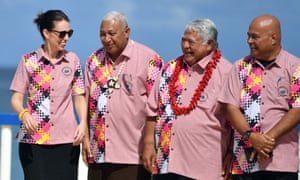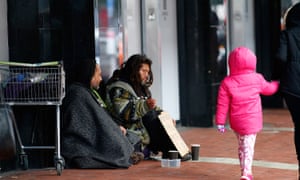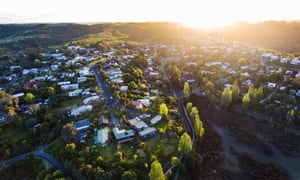The Guardian asked its New Zealand readers to put questions to prime minister Jacinda Ardern, as she and her government gear up for an election in 2020. Here are her responses:
Q. New Zealand will find it difficult to reduce carbon emissions to our agreed targets. Also, our impact on global emissions will be small. What can NZ do to help make significant reductions on other countries, especially those without resources to do so? Could NZ could lead an alliance of smaller countries to achieve this? Cliff Turner, 72, Wellington
A. Right now, the minister for climate change, James Shaw, is leading a delegation from New Zealand at the annual international climate change negotiations. Whilst there, he has been sharing with other countries the huge progress we have made here at home, not least with our historic Zero Carbon Act.
There is still a lot of work to do, as you suggest, but after decades of inaction we are finally leading New Zealand on a journey that we must all take together to solve climate change.
Our Pacific neighbours are among those most uniquely at risk from the changes we are forcing on the climate. Rising sea levels, ocean acidification and disruptive weather patterns, are just some of the consequences threatening Pacific peoples’ livelihoods and ability to provide for their families. This is exactly why at least two thirds of New Zealand’s $300m of climate-related support between 2019 and 2022 will be provided to Pacific nations.

Back in September, I was proud to announce that we would start negotiations with four other small countries – Norway, Iceland, Fiji and Costa Rica – to remove tariffs on environmental goods such as solar panels or wind turbines, and curb fossil fuel subsidies. Minister Shaw is reaffirming that commitment at the international negotiations. We have also contributed $15m over four years to the first replenishment of the Green Climate Fund, which supports the efforts of developing countries to respond to the challenge of climate change.
Q. Do you think that the current view on the climate crisis has become too affiliated with the left/right spectrum of politics? Gideon Bickler, 16, Auckland
A. I don’t think most people view their lives in terms of the left/right political divide – and I hope we don’t see climate change that way either. I think most New Zealanders just want to see us take action on the issues that matter most to them, including environmental issues.
Recently our new Zero Carbon Act passed through parliament unopposed. In other words, every political party has sent a clear message to New Zealanders that no matter who is in government we are all committed to significant domestic greenhouse gas emissions reductions.
The Zero Carbon Act was conceived of by a movement of young people as a way to depoliticise climate change policy so that we can actually start to make some progress. That’s exactly what we have done.
Q. May I know what will be your immigration policy going forward now that New Zealand will meet the 5 million population mark soon? Will your policy be more welcoming to international students like me who might opt to stay on to contribute to your country and will you formulate an attractive policy to lure in more international students whose parents may or will have spent millions to support their children’s education in New Zealand (this is also a way to boost your country’s GDP)? Ballerina Chong, 19, Wellington
A. We have a range of different things our immigration policies are designed to achieve. We want to ensure that:
-
New Zealand businesses can get the workers they need where skill shortages exist
-
Our immigration settings respond to regional differences
-
Migrants are not exploited
-
New Zealand meets its international and humanitarian commitments
If students have the skills we need they will be able to work here. But we also want to make sure that the courses provided for international students are quality courses that will give them good skills for their future careers wherever they may go.
Q. Will NZ change its name to Aotearoa when the Queen dies? John Irving, 77
A. Te Reo is an official language of this country so Aotearoa is one of the names we are lucky to have already.
Q. When is your government going to make the transformational change to child poverty that you promised? Douglas, 75, Porirua
A. We have committed to reducing child poverty by at least half within 10 years. The Child Poverty Reduction Act requires the government to set targets and report on child poverty every year. This is huge as it creates a framework for ongoing action and accountability by this and all future governments.
Achieving our targets will mean our child poverty rates are amongst the lowest in the world. Every step we take to get closer to our targets represents a tangible improvement in the day-to-day lives and future opportunities of those families and children who are no longer in poverty.
Our first two budgets have included actions to significantly reduce child poverty and material hardship. The most significant of these was our $5.5bn families package, which increased the family tax credit and accommodation supplement, and introduced the best start and winter energy payments. In Budget 2020, we indexed benefits to wages, and increased the amount that beneficiaries can earn before their benefit reduces. These changes are expected to lift between 42,000 and 73,000 children out of poverty.
We have also taken action to ease the financial pressures felt by low-income families, by reducing health, education and other costs. The impact of many of these investments isn’t captured in current child poverty reporting the release of new Statistics NZ data in early 2020 will be the first indication of the progress we’re making in reducing child poverty.
Q. How will Labour address the persistent wealth gap in Aotearoa/New Zealand and allow our children to aspire to own their own homes? Rachael Findlay, 57, Te Whanganui-a-Tara, Wellington
A. This government views the economy as a means to an end, not as an end in itself. A strong, healthy economy is vital to New Zealand but only is as much as it means we can share the benefits more widely among all New Zealanders and their families.
Our Wellbeing Budget was a big step towards making this a reality. When we came into office budgets measured the wealth and success of New Zealand on just the narrow metric of economic growth – GDP.
We have fundamentally changed the way budgets are put together and how they are delivered. The result is budgets now reflect what New Zealanders value including how many children have been lifted out of poverty, how much cleaner our environment is and how we are future proofing the economy.
Innovations such as this will help narrow the wealth gap that exists in New Zealand and, accordingly, will put home ownership within reach of more people.
Major investments will continue to be made in health, education, housing and social programmes to address New Zealand’s long-term challenges. And we have also created more jobs and raised wages, made it cheaper to pay the bill (via the winter energy payment), made it cheaper to visit the doctor and to send kids to school. We have also banned foreign speculators from purchasing property in New Zealand.

Q. What are you doing/will you do to ensure free, independent journalism in New Zealand? Sincerely, a recently graduated, jobless journalist. Gordana Rodden, 23, Wellington
A. As we all know, the media industry has changed hugely in recent years as traditional advertising revenues are increasingly diverted to online social media platforms. This has created a real issue for an industry that is now struggling to make the money to pay journalists.
Free, independent journalism is a core part of any democracy and something we must guard jealously. In New Zealand, the government funds Radio New Zealand and TVNZ in order to ensure it continues. But even then, there are funding problems and the organisations are hampered in what they can do with limited resources.
This is why broadcasting minister, Kris Faafoi, is currently looking for potential alternatives to ensure the ongoing strength of independent local journalism. He is hoping to announce some more details soon.
Q. How can we stop the “culture wars” growing in NZ? Guns, abortion, water, climate change and the planned referendums have the potential to split NZ just like Brexit has split the UK. Ian Andrews, 55, Wairarapa
A. I agree no one wants to see division, but I do think New Zealanders have shown they can live happily side by side while holding strong and varying views. Yes these can be emotional decisions but I trust that New Zealanders will have the debates while remaining respectful of one another and of differing views. In fact I think that’s one of the things that sets us apart.
Q. Do you think that NZ could take an even stronger lead on accepting refugees to Australasia (including possible climate refugees from the South Pacific nations), particularly in light of Australia’s continual refusal to take a fair quota? Nigel Dowdeswell, 57, Hamilton
A. We have made a significant increase in our refugee quota this term and we are working hard to ensure that we are ready for that increase. New Zealand’s refugee programme includes:
-
a high quality refugee resettlement programme that is internationally acclaimed and provides up to a year of support once in the community
-
increased the refugee quota up to 1,500 each year, which will be in place by 2020 and a significant amount of work is underway to support this
-
we have announced new regional settlement plans for six new regions
-
we are making improvements to the Mangere Refugee Resettlement Centre to support our refugees for their 6 week induction programme
Q. What practical plans does Arden and her government have to resolve the housing issues experienced by many New Zealanders – whether it be overpriced, poor unsuitable rentals, the lack of real social housing options, the price of ownership being un-affordable for many New Zealanders, or the lack of temporary beds for those in acute need? Jamie Lynch 34, Wellington
A. After significant neglect in housing, we’re starting to make progress on several fronts. So far we have stopped the previous government’s sell-off of state houses, and have added over 3,600 additional houses to the stock. There are currently 2,400 state houses under construction and 13,000 in the pipeline in total. We know we have an ever-growing waiting list, but it is possible to meet that demand. If the National government had built state houses at the pace of our targeted 1,600 per year we’d have an additional 14,400 state houses – that’s the entire waiting list gone.
In terms of homelessness, we’re rolling out Housing First across New Zealand, and as at the end of October there were over 1,000 individuals and families engaged.
I recognise that KiwiBuild homes will be out of reach for some families which is why we’re building state houses and making life better for renters by banning letting fees, and modernising rental laws.
We’ve recently put $400m into progressive home ownership which will both lower deposits and mortgage repayments. We expect this will help thousands of families to buy their own homes.
We’ve also made changes to the First Home Scheme, lowering the deposit required for a government-backed mortgage to 5%, and allowing family and friends to combine their $10,000 First Home Grant to buy their first home together. These changes will make a significant difference in helping families who have been locked out of the housing market.

Q. How are you going to safeguard democratic freedoms in New Zealand in terms of overseas and internal lobby group interests funding election campaigns? Jennifer Ashby, 52, Dunedin
A. We’ve already taken action to protect New Zealand from foreign interference in our elections by banning foreign donations to political parties and candidates.
The Electoral Amendment Bill (No 2), which passed in early December, bans foreign donations over $50. This will reduce the risk of foreign money influencing our election outcomes.
The bill also extends the requirement to include name and address details on election advertisements to apply to election advertisements in all mediums. This means that if someone wants to advertise online they need to say who they are, the same as if it was published in a newspaper.
The minister of justice has also signalled a wider review of the Electoral Act after the 2020 general election.
Q. While China funds and influences New Zealand and Australian politics, burgles and intimidates a critical academic, and keeps a million people in gulags, your government continues to snuggle up to the panda. I fully concede that the opposition would cheerfully do more than snuggle. Isn’t there a more principled path you could take? Paul Kiely, 39, Wellington
A. Forgive me for pushing back on you there Paul! Although we have a solid and growing relationship, New Zealand and China are very different countries. There is a significant asymmetry in size, we have fundamentally different political systems and values, and on some issues we have quite different approaches.
It is only natural that there are areas where we do not see eye-to-eye and when that occurs, we raise it. For example, New Zealand regularly discusses human right issues with China, including the situation in Xinjiang.
New Zealand closely follows human rights issues in our region, and we share international concerns regarding the treatment of Uighurs. This is why I raised New Zealand’s concerns about the situation in Xinjiang with President Xi Jinping and Premier Li Keqiang during my visit to China in April. I also raised concerns with Premier Li during our meeting in Bangkok in November this year.
New Zealand also joined a statement alongside 22 other countries expressing our concerns. The statement was delivered at a United Nations general assembly meeting in New York, and in in July, we signed a letter alongside 24 other countries, addressed to the president of the Human Rights Council and the UN High Commissioner for Human Rights.
We will continue to raise our concerns directly with China and use these opportunities to explain the importance that New Zealand attaches to human rights standards. New Zealand also takes any allegations of foreign interference in New Zealand seriously. Some media speculation has focused on China, but we do not single out any specific actor.
The important thing is that we have flexible and adequate protections. We have robust measures in place to protect our values, institutions and economy.
Q. What is one thing you want to accomplish in your second term if you get re-elected in 2020? Justin Lindsay
A. We haven’t set our policy agenda for the next election yet but the plan is to continue to build on the work we have done in the first term to deliver a better New Zealand for more people.
But as finance minister, Grant Robertson, said when releasing the budget policy statement foreshadowing the direction of travel for the government, we will continue our focus on tackling the long-term challenges facing New Zealand while also investing to future proof the economy.
The Budget 2020 priorities – which would carry work over into the next term – are:
-
Just Transition:Supporting New Zealanders in the transition to a climate-resilient, sustainable, and low-emissions economy
-
Future of Work: Enabling all New Zealanders to benefit from new technologies and lift productivity through innovation
-
Māori and Pacific: Lifting Māori and Pacific incomes, skills, and opportunities
-
Child Wellbeing: Reducing child poverty and improving child wellbeing
-
Physical and Mental Wellbeing: Supporting improved health outcomes for all New Zealanders
Q. Young women are so commonly treated with such disdain and in blatant forms of sexism amongst male school peers and teachers too. How will you battle New Zealand’s misogynistic culture that’s so very rampant in our schools? William B, 49, Auckland
A. Rebel against it! We have to do what we can to call out bad behaviour, but also to have plenty of role models too. I can’t say I’ve been told our schools are any worse than anywhere else, but there’s almost always more to do to make sure our young women are treated fairly.
Q. Why is New Zealand risking 1080 invading our food chain? Kris Davies, Otago, 33
A. We’re using all the tools we’ve got in the box to restore the dawn chorus and save Aotearoa’s precious kiwi, kākāpō, and whio from the predator crisis. 1080 is the best tool for large scale predator control and it dissolves quickly in the environment into harmless substances. We do want alternatives, but until we find them it’s the best we’ve got to combat predators.
Q. What’s the best way to batter snapper, and how long do you deep fry it? Ian, 52, Tuakau
A. What a controversial question Ian! Pan fried is best for delicious fresh snapper (in my opinion) but if you like a wee coating, I’m a big fan of a bit of panko crumb (dip in flour, then egg, then panko). Either way, when you come to cook it, use a rice bran oil (it takes higher temperatures well) and a dollop of butter. Go well!
-
Simon Bridges, the leader of the opposition, was invited to answer readers’ questions but declined.







